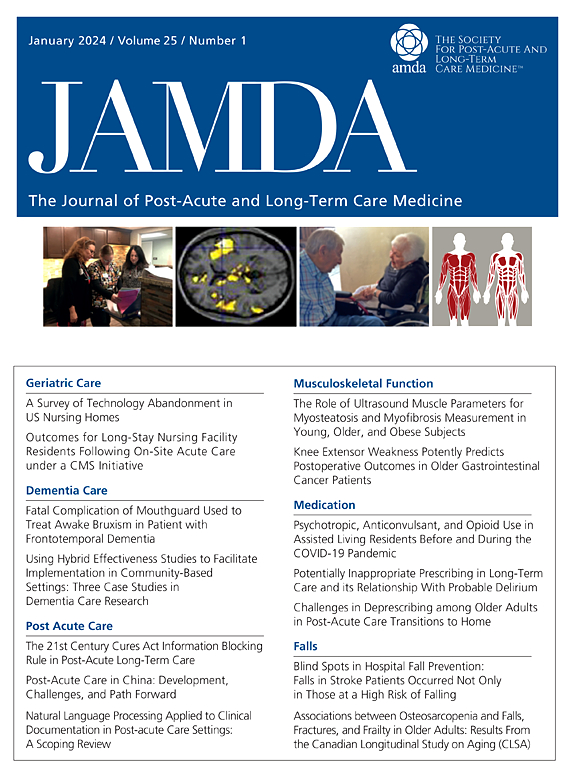Challenging Yet Rewarding: Staff Experiences in Prolonged Disorders of Consciousness Rehabilitation
IF 4.2
2区 医学
Q2 GERIATRICS & GERONTOLOGY
Journal of the American Medical Directors Association
Pub Date : 2025-04-10
DOI:10.1016/j.jamda.2025.105564
引用次数: 0
Abstract
Objectives
This study explored the experiences and needs of healthcare professionals providing specialized neurorehabilitation for patients with prolonged disorders of consciousness (PDOC) in post-acute and long-term care settings.
Design
A qualitative study within the nationwide PDOC chain-of-care, including early intensive neurorehabilitation (EIN) in one rehabilitation center and prolonged intensive neurorehabilitation (PIN) in 3 specialized nursing homes up to 2 years post-injury.
Setting and Participants
Fifty-two healthcare professionals (nurses, physicians, and rehabilitation therapists) aged ≥ 18 working at either EIN or PIN with at least 1 year working experience in PDOC care were included.
Methods
Five discipline-specific focus group discussions, 2 in-depth interviews, and 9 written testimonies were conducted between November 2021 and May 2022. Data were thematically analyzed.
Results
Five themes describing rewarding aspects— complexity of work, providing meaningful care to patients, supporting families, multidisciplinary collaborations within teams and care network, works' personal impact and professional enrichment— and 4 themes describing challenging aspects— confrontation with patients' condition and families' grief, moral distress, complex interaction with families, personal and professional impact— were identified. For sustainability, healthcare professionals need improved working conditions, specialized training (especially communication skills and resilience trainings), and psychological support to deal with both families’ expectations and moral distress. They also urged for better family support systems and continued improvement in care procedures.
Conclusion and Implications
This study emphasizes the challenging yet rewarding nature of specialized neurorehabilitation for patients with PDOC and its impact on healthcare professionals while highlighting their unmet needs. These insights can be implemented to improve existing care programs and establish criteria for institutions delivering this care. Acknowledging burdensome aspects of this work, investment in the well-being of professionals by their employers and policy reforms focused on improved working conditions, specialized training, and psychological support is crucial for sustainable and resilient PDOC care.
求助全文
约1分钟内获得全文
求助全文
来源期刊
CiteScore
11.10
自引率
6.60%
发文量
472
审稿时长
44 days
期刊介绍:
JAMDA, the official journal of AMDA - The Society for Post-Acute and Long-Term Care Medicine, is a leading peer-reviewed publication that offers practical information and research geared towards healthcare professionals in the post-acute and long-term care fields. It is also a valuable resource for policy-makers, organizational leaders, educators, and advocates.
The journal provides essential information for various healthcare professionals such as medical directors, attending physicians, nurses, consultant pharmacists, geriatric psychiatrists, nurse practitioners, physician assistants, physical and occupational therapists, social workers, and others involved in providing, overseeing, and promoting quality

 求助内容:
求助内容: 应助结果提醒方式:
应助结果提醒方式:


